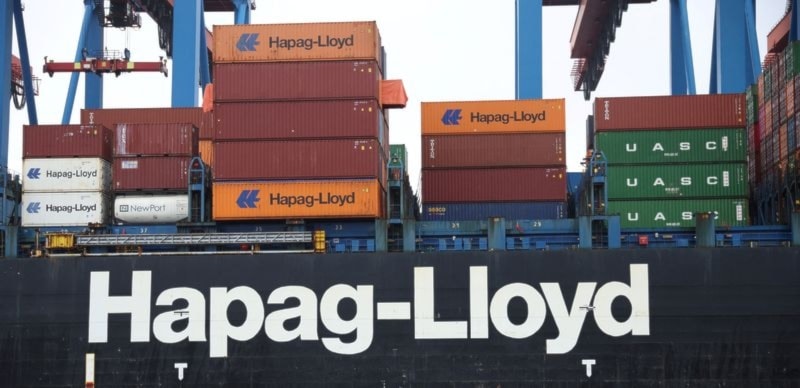Hapag-Lloyd, Evergreen not to cross Red Sea even with US-led coalition
Germany's Hapag-Lloyd says the situation in the Red Sea remains "too dangerous" for navigation.
-

A container ship is unloaded at the Port of Newark in Newark, N.J. Wednesday, March 20, 2006 (AP)
Shipping giants Hapag-Lloyd and Evergreen Line told CNN on Wednesday that their vessels will continue to avoid the Red Sea and sail around Africa, despite the US announcing a 20-nation maritime coalition to repel Yemeni operations aimed at Israeli ships and vessels heading to the occupation entity.
Meanwhile, MSC followed in Hapag-Lloyd's footsteps of avoiding any route via the Red Sea.
“At the moment we still consider the situation too dangerous to pass,” a spokesperson for German Hapag-Lloyd stated. “We continuously assess the situation and plan a next review on Friday.”
Doubts over the US-led coalition's effectivness
After over a week of the Pentagon announcing the launch of Operation Prosperity Guardian (OPG), the coalition continues to be haunted by the reluctant participation of its members and uncertainty behind the operation's objectives.
Major member countries have announced stepping back or scaling down on commitment to the alliance, including France, which said it will not be operating under Washington's orders and will limit its operations to protect EU vessels, and Spain, which declared it will not participate entirely.
Many officials and maritime experts are doubting the group's effectiveness in facing Yemeni attacks, especially given the asymmetric warfare Sanaa is capable of engaging in, which mainly includes the extremely low financial costs of attacks - drones valued at a few thousand dollars - compared to high expenses of repelling them with multi-million dollars interceptor missiles.
Read more: Yemeni Armed Forces have 'upper hand' over US in Red Sea
Furthermore, the Yemeni Armed Forces conducted an operation on Tuesday targeting the MSC UNITED cargo ship, raising concerns that the US-led operation will not be able to stop all attacks and that threats to Sanaa over its attacks are ineffective.
“Our first priority remains protecting the lives and safety of our seafarers, and until their safety can be ensured MSC will continue to reroute vessels booked for Suez transit via the Cape of Good Hope,” the company stated.
Response differ but impact remains the same
However, this did not stop Maersk from announcing that it is preparing to resume transit via the Red Sea, citing the launch of the OPG as a reason behind the decision.
"With the OPG initiative in operation, we are preparing to allow for vessels to resume transit through the Red Sea both eastbound and westbound. We are currently working on plans for the first vessels to make the transit and for this to happen as soon as operationally possible," the company stated.
Meanwhile, CMA CGM took a more cautious approach.
In a Tuesday statement, the company said some of its ships sailed through the Red Sea, noting that it is "currently devising plans for the gradual increase in the number of vessels transiting through the Suez Canal.”
According to the firm, this move was “based on an in-depth evaluation of the security landscape.”
Yemeni operations achieve their goals
With every operation, the Yemeni Armed Forces confirm that they will continue to carry out attacks in the Red and Arabian seas against Israeli ships or vessels bound to the occupation entity until sufficient food and medicine are delivered to Gaza.
But most importantly, the army reiterates that it is "fully committed to ensuring the continued maritime navigation to all destinations except to the Israeli entity."
Read more: African ports overwhelmed by ships rerouting from Red Sea
The equation enforced by Sanaa has indeed resulted in companies introducing a risk charge on ships sailing to the entity via the Suez Canal. This resulted in fears rising in the occupation entity of the impact on the cost of goods and inflation in an economy already struggling due to the war on Gaza.
“The dynamic situation in the Red Sea and the necessary operational adjustments are causing disruptions throughout the network which will impact schedules and equipment supply,” Hapag-Lloyd said in a statement Friday as it announced an “Emergency Revenue Charge” for commercial ships traveling to and from the Red Sea until the end of December.
This measure was earlier also adopted by Maersk and CMA CGM.
Read more: Israeli economy to shrink 2% as workforce is displaced, drafted

 4 Min Read
4 Min Read








